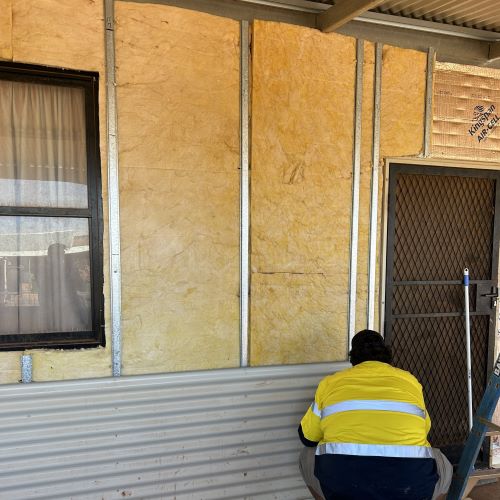
An ambitious housing project led by the University of South Australia, the SA Government and industry partners is making homes in the Anangu Pitjantjatjara Yankunytjatjara (APY) Lands more comfortable and energy efficient.
The APY Lands Energy Efficiency Retrofit Pilot, part of the national RACE for 2030 Cooperative Research Centre, is improving energy efficiency in desert housing, where summer temperatures soar above 45°C and winter nights plunge below freezing.
Since launching the pilot in December 2023, the project team has installed energy monitoring devices in 12 households and completed retrofits on six homes in an APY community. The homes are managed by key project delivery partner, the SA Housing Trust.
The trial retrofits are targeted solutions to reduce air leakage, increase insulation, and reduce thermal bridging - where heat or cold bypasses insulation through the steel building frames.
With 15 project and industry partners, the team has assessed 20 homes, interviewed residents, installed monitoring equipment, built two test rooms in Adelaide, and modelled over 100 retrofit scenarios.
In addition to the retrofit work, the team has produced household energy efficiency and trade training education materials in consultation with the community, to ensure residents know how to get the best outcomes in their homes. Local trades will take part in rolling out the retrofits to remaining APY households.
Lead investigator, UniSA Sustainable Engineering Systems researcher Professor Ke Xing, says the project combines scientific rigour with practical on-the-ground training.

"This pilot is not only improving living conditions in one of the toughest climates in Australia; it's also creating a blueprint for future upgrades in remote and regional communities across the country," Prof Xing says.
"In the past year we have collaborated closely with the community, local maintenance workers and our industry partners, all of whom have shown an extraordinary commitment."
Key findings so far show that addressing uncontrolled air leakage delivers the greatest improvements in thermal comfort and energy efficiency.
Currently winter - more so than summer - is the most uncomfortable period for APY communities. Households rely heavily on inefficient electric radiant heaters, with some resorting to ovens for warmth - an unsafe and costly practice.
Upgrades so far include new bulk insulation in the roof and adding continuous insulation to external walls, self-closing exhaust fans, evaporative cooling dampers, and sealing common air leakage points throughout the homes.
Local tradespeople were trained on-site, supported by custom training resources and guidance from retrofit experts.
Importantly, residents themselves are noticing the difference.
"Common feedback from residents was that their homes were cooler this summer, due to the retrofits. That anecdotal feedback supports our early testing, and we are in the process of conducting full evaluations over the 2025 winter," says Prof Xing.
UniSA researchers partnered with the SA Department for Energy and Mining, the SA Housing Trust, and community focused organisations such as Healthabitat and Nganampa Health Council. They worked closely with the Iwantja Community Council and local residents, including Aṉangu Energy Education Workers supported by MoneyMob Talkabout.
The project also involves organisations with technical expertise who have provided knowledge and product support, including the Insulation Council of Australia and New Zealand (ICANZ), Kingspan, Sika Australia, Powertech Energy, Efficiency Matrix, and the Air Tightness Testing and Measurement Association (ATTMA).
Aboriginal Affairs and Reconciliation in the Attorney-General's Department has also partnered and contributed to the project, and TAFE SA, CodeSafe Solutions and Pointsbuild have contributed the development to the trade training program.
As part of the Pilot's legacy, trade training programs have been developed to support a broader rollout of housing retrofit skills in remote communities. A "train-the-trainer" event was held in Adelaide in 2024, involving TAFE, SA Housing Trust, Renewal SA and Building Contractor (Furnell's) staff. Local TAFE students were provided with Net Zero Energy Builder Scholarships to support energy efficient construction in the APY Lands.
The next steps include re-testing the retrofitted homes and expanding the model to other APY communities.
"Ultimately, we want this project to inform national guidelines for remote housing upgrades, tailored to the needs and voices of Aboriginal communities," says SA Department for Energy and Mining Project Manager Lynda Curtis.
"Aboriginal people have lived in Australia's desert regions for tens of thousands of years, but temperature extremes have become more pronounced due to climate change," Ms Curtis says.
"With broader climate extremes and overall hotter summers predicted for the future, how people are living and maintaining healthy communities on Country is of growing concern, and we are invested in providing solutions to those challenges."
Notes for editors
RACE for 2030 (Reliable, Affordable Clean Energy) is an innovative, collaborative research centre for energy and carbon transition. The Federal Government has provided $68.5 million, supplemented by $280 million in cash and in-kind contributions from partners. Its aim is to deliver $3.8 billion of cumulative energy productivity benefits and 20 megatons of cumulative carbon emission savings by 2030.






